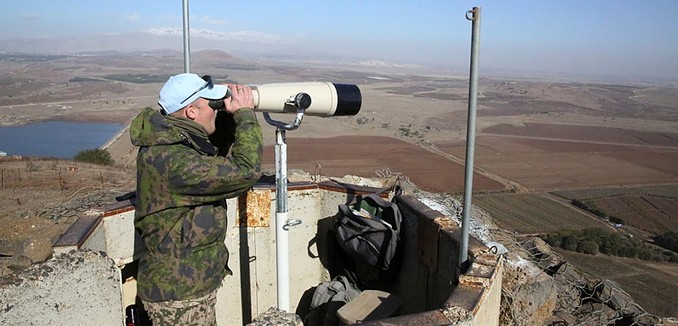Israeli Prime Minister Benjamin Netanyahu reportedly asked President Donald Trump during their meeting in the White House on Wednesday for the U.S. government to officially recognize Israeli sovereignty in the Golan Heights, which Israel captured from Syria in the 1967 Six-Day War and annexed in 1981. Trump’s approval of Netanyahu’s request would be beneficial for both countries, two think tank experts wrote in The Wall Street Journal on Thursday.
American recognition of Israel’s control of the Golan “would provide the Israeli government with a diplomatic win while helping the Trump administration signal to Russia and Iran that the U.S. is charting a new course in Syria,” wrote Mark Dubowitz and Jonathan Schanzer, respectively the executive director and vice president for research of the Foundation for Defense of Democracies.
The Syrian government has for decades refused to consider peace with Israel unless the Jewish state totally withdrew from the Golan. But given the chaos in Syria due to the country’s six-year civil war, “the facts on the ground have changed.” If Israel had made a deal with Syria to give up the Golan, “Islamic State, al Qaeda or Iran would be sitting on the shores of the Galilee across from the Israeli city of Tiberias,” they wrote.
The Israelis believe that Syria will eventually be partitioned “along sectarian, ethnic and regional lines,” the researchers explained. Given this assumption, the White House’s support for Israel’s claim to the Golan would “signal to Russia that, while Washington may now coordinate with Moscow on activities such as fighting Islamic State, it doesn’t share Russia’s goals for Syria,” which include the complete reconquest of all rebel-held areas. Recognition of Israel’s claim would also show that the administration “will take a tougher line on the provision of arms and intelligence to Iran and Hezbollah.”
Such a move would also help Israel diplomatically by establishing a precedent for peace negotiations that Israel need not abandon all territory it gained in 1967.
The authors also dismissed many objections to their proposal. While the Arab League would likely protest such a move, they would likely also see Israeli control of the Golan as “a blow to the Assad regime and its patrons in Tehran,” which “will be seen as a win by these regional Arab players, especially if the Trump administration makes it clear that this is the goal.”
Nor do they anticipate that the Golan Druze community would foment unrest as a result of Israeli sovereignty, as “the carnage inside Syria has made the stability and prosperity of Israel increasingly attractive.”
Other notable experts and politicians have also supported recognition of Israeli sovereignty over the Golan Heights.
Former Israeli ambassador to the United States Michael Oren, now a member of the Knesset, wrote for CNN.com in November 2015 that American recognition of Israeli control would both enhance Israeli security and contribute to regional stability.
Legal scholar Peter Berkowitz, a senior fellow at the Hoover Institution, argued in RealClearPolitics in February 2016 that Israel’s possession of the Golan was “lawful and just” and should be supported by the United States and the international community.
Two of Trump’s former rivals for the Republican presidential nomination have also supported continued Israeli control of the Golan Heights. “Given the presence of hostile terrorist organizations ranging from ISIS to Hezbollah on Israel’s northern border, it is foolhardy and dangerous for elements in the international community to try to pressure Israel to abandon the Golan to the chaos engulfing Syria,” Sen. Ted Cruz (R-Texas) said in a statement in April.
A month later, Sen. Marco Rubio (R-Fla.) said while speaking at the Hudson Institute that “on the issue of the Golan, there is no one to turn it over to….As part of the final matrix” of a permanent peace agreement, “it’s likelier than not that the Golan Heights will remain in Israeli control for a long, long time.”
In The Case for Israeli Sovereignty in the Golan Heights, which was published in the May 2016 issue of The Tower Magazine, Eylon Aslan-Levy argued that there is no realistic scenario by which Syria will return to its pre-war form, thus making it inconceivable for Israel to return such a strategically significant area.
No serious observer, however, believes that Syria can be reconstituted. The Kurds declared an autonomous Federation of Northern Syria (Rojava) in March 2016, and will not surrender this freedom lightly. The Syrian opposition is against a formal partition of Syria, but the option of transforming the country into a federal state is on the table. If the country’s five-year-long civil war continues, interest in partition will likely grow, either as a last resort or recognition of an existing reality. The logical corollary of ceasefire efforts is that a de facto partition will begin to crystallize, as none of the warning parties will agree to govern together or be governed by each other. “We know how to make an omelet from an egg,” observed Israeli Defense Minister Moshe Ya’alon, but “I don’t know how to make an egg from an omelet.”
Any geopolitical settlement that involves redrawing Syria’s borders for the sake of regional security must also rubber-stamp Israel’s control of the Golan for the same purpose. The Heights have now been governed by Jerusalem for over twice as long as Damascus—49 years versus 22. It is time to recognize that change as permanent.
[Photo: Yossi Zamir / Flash90 ]




